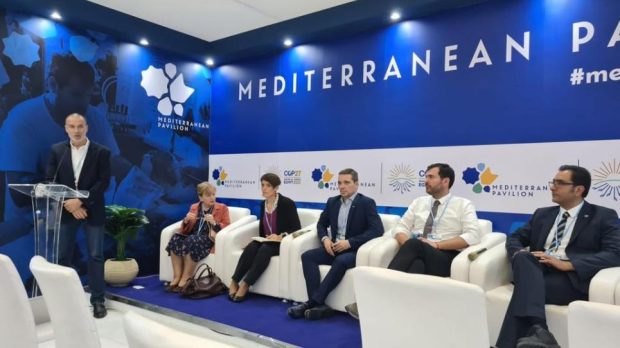BETA TC participated in three sessions of the Mediterranean Pavilion at COP27
The Mediterranean Pavilion has been promoted by the Union for the Mediterranean, the PRIMA Foundation and UNEP-MAP

The BETA Technology Centre of the UVic-UCC has had a prominent presence at the 27th United Nations Conference on Climate Change (COP27), which is taking place until tomorrow, Friday, in Sharm El-Sheikh (Egypt). The director of CT BETA, Sergio Ponsá, has represented this centre in three sessions, as part of the programme of activities of the Mediterranean Pavilion, an initiative that has been incorporated for the first time in this conference. The Mediterranean Pavilion has been promoted by the Union for the Mediterranean, the PRIMA Foundation and UNEP-MAP, together with a group of relevant organisations and a scientific committee, led by the Mediterranean experts on climate and environmental change (MedECC), which brings together 600 scientists.
The first session in which Ponsá participated, organised by the PRIMA Foundation, served to place agri-food systems at the centre of the debate on sustainable development, due to their impact on climate change, CO2 emissions and the need to improve food security at a global level. Part of his speech was devoted to explaining the contribution of the TRANSITION project, which is working to identify real practices that help to adapt agroforestry practices to Mediterranean realities.
Ponsá’s second intervention took place in a session organised by MedWaves in which he reflected on the nexus between the circular economy and the reduction of greenhouse gas emissions, exploring the net zero potential of key value chains, based on circularity strategies and the multiple intertwined opportunities for social and economic development. Ponsá presented some strategies to improve circularity based on the opportunities offered by the bioeconomy in agri-food value chains.
Finally, one of the sessions organised by the Interreg MED programme served to argue why green and blue innovation should move forward together and to discuss the role of public authorities in the adoption of circular economy strategies in these areas. The Med Green Growth Community, led by the BETA TC since 2016 and supported by the Union for the Mediterranean, played an important role in this session.
